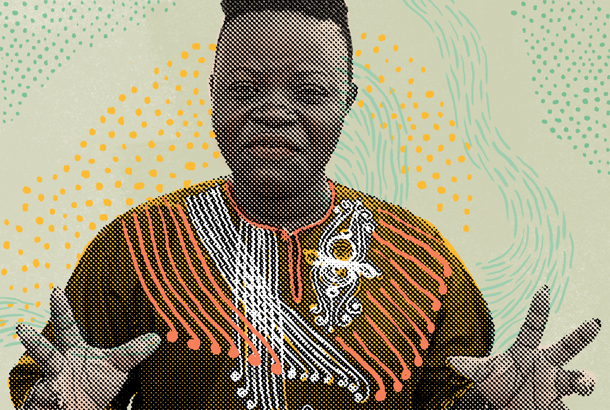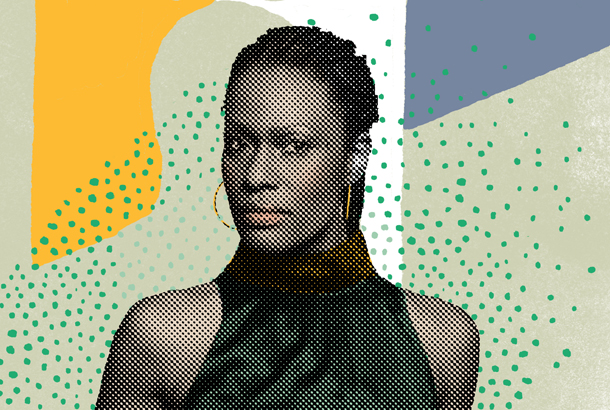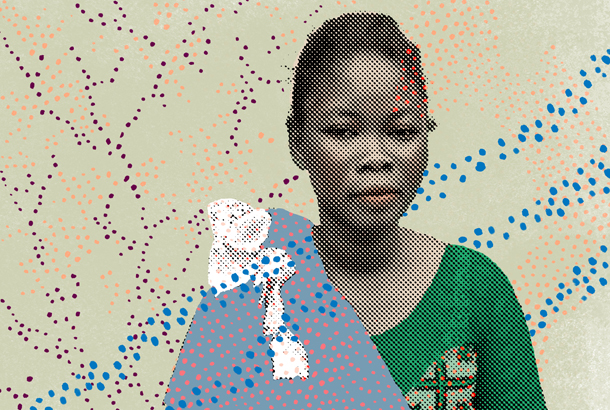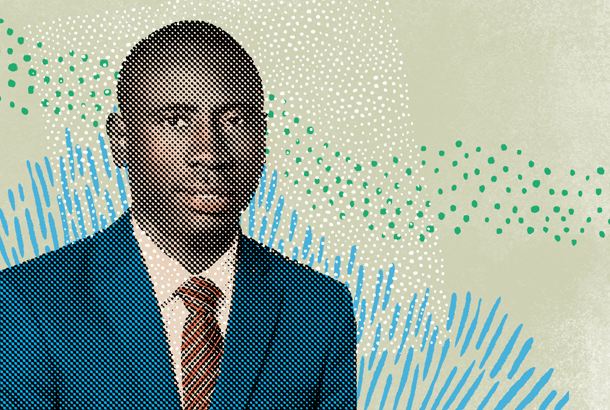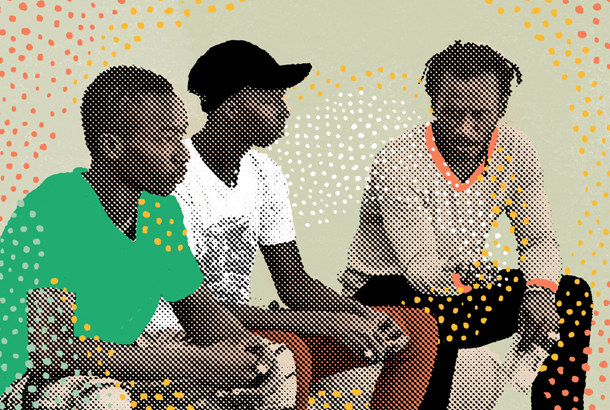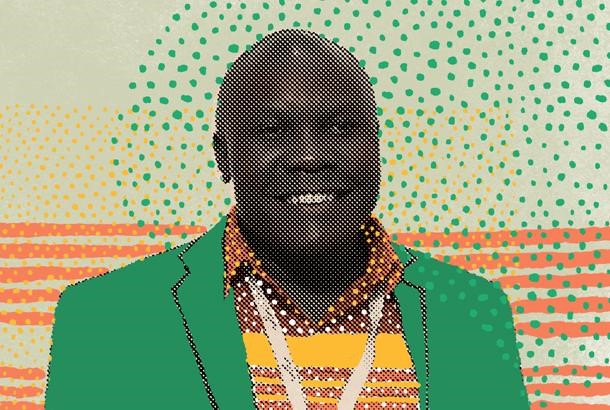Profiles from African Countries
Survivors and practitioners
Combatting Enslavement by Relatives
Volunteers to Support International Efforts in Developing Africa (Liberia)
Illustration by Vérane Cottin, photograph by VOSIEDA
In Liberia, some rural parents send their children to live with relatives and friends in urban centers who employ them as domestic workers, street hawkers, prostitutes and quarry workers — all living without pay and in dire conditions. In 2018, the United Nations Human Rights Committee expressed its concerns about reports that children are subject to forced labour, in particular as street vendors, beggars or domestic servants, and to the worst forms of child labour.
Darius Kolleh, 14, was one of these children.
Brought to the capital Monrovia from Bolor-la, a village in Central Liberia, by his sick, single mother, Kolleh moved in with his uncle in exchange for better care for her.
“My uncle would not support me, and he surrendered me to another host family. They forced me to work as an enslaved domestic servant and artisan rock crusher.” Kolleh was also beaten, forced to live in inhumane conditions and was neither educated or paid for working 60 or more hours a week.
Kolleh’s captors kept him out of sight and away from other children. One day, having noticed the conditions in which he lived, neighbors informed one of the program officers of Volunteers to Support International Efforts in Developing Africa (VOSIEDA).
Liberty in Liberia
Founded in 2003, VOSIEDA has directly assisted more than 600 victims of modern-day slavery through psychosocial counseling, medical and humanitarian support, including with the financial support of the United Nations Voluntary Trust Fund on Contemporary Forms of Slavery. For the past 15 years, the organization has also advocated for legislation that prevents exploitation of children; promoted corporate responsibility regarding child labour; and educated first responders and lay people about the issue so they can identify and help free child slaves.
“We had many discussions with his host family to explain the law against child slavery. But we finally rescued Darius in 2020 and tried to reunite him with his biological parents,” said Amanda Yarsiah, a VOSIEDA program officer. “Darius's mother was unable to care for him because she is sick; he has been placed in foster care and is now going to second grade.”
Yarsiah, who coordinates the day-to-day implementation of anti-slavery activities, as well as public awareness campaigns, recalls that slavery is still widespread, affecting more than 40 million people worldwide.
“The situation is grim in Liberia,” she added. “Thousands of women and children are affected by human trafficking, sexual exploitation, the worst forms of child labor, forced marriage and the forced recruitment of children for use in armed conflict and drug trafficking.”
VOSIEDA received its first grant from the United Nations Voluntary Trust Fund on Contemporary Forms of Slavery in 2011.
Finding a Path Home
Pathfinders Justice Initiative (Nigeria)
R. Evon Idahosa, Executive Director (illustration by Vérane Cottin, photograph by Pathfinders Justice Initiative)
Bimpe* was sold by her uncle in 2020 to traffickers in Libya where she was drugged, abducted and raped on several occasions. As a result, she got pregnant and had to undergo several abortions. Bimpe was coerced into unpaid sex work by her traffickers, physically harassed and threatened, leading to a deep psychological trauma. “I felt like I lost total control of my freedom and my life,” she said.
In 2021, she found Pathfinders Justice Initiative. Based in Benin City, Edo State, it provides holistic support to survivors of trafficking for sexual exploitation. It helped Bimpe obtain medication, food, clothing and shelter, as well as psychological support to help her to reintegrate with her family and community. “Thanks to Pathfinders, I worked on my mental health to build confidence and trust and after participating in a Business Skills training and receiving a start-up allowance, I started thinking of opening my own business” says Bimpe.
From Victim to Survivor to Advocate
With support of the United Nations Voluntary Trust Fund on Contemporary Forms of Slavery, Pathfinders Justice Initiative has been able to grow significantly. Over the last three years, this support has helped Pathfinders to build credibility in their local community and across Nigeria. As a result, they are considered leading experts in Nigeria's fight against human trafficking. The organization provides direct assistance utilizing a gender-sensitive, human rights-based, survivor-centered and trauma-informed approach which seeks to transform the women it assists from victims to survivors to advocates.
Through the Fund's support, Pathfinders has been able to provide support for 210 women survivors of trafficking, exploitation and torture. During the pandemic, it developed an ongoing COVID-19 food drive and mobile medical clinics for survivors, in addition to operating their 20-bed shelter. Moreover, in 2022, the organization jointly developed Edo State's Coordinated Care Mechanism with 27 civil society organizations, Nigeria's first state referral mechanism. “While most other grants are short-term and cannot provide sustainability, continuous support from the UN Fund has helped us to build and maintain partnerships with all primary state and non-state stakeholders, as well as a sustained community presence”, said R. Evon Idahosa, the founder and Executive Director of Pathfinders Justice Initiative.
Edo State is considered the hub of sex trafficking in Nigeria. But, in the past few years, the number of people trafficked from the state, and Nigeria as a whole, has reduced significantly as a result of efforts from Pathfinders Justice Initiative and its partners.
Pathfinders Justice Initiative received its first grant from the United Nations Voluntary Trust Fund on Contemporary Forms of Slavery in 2009.
A Fulfilling Life for Each Child
Centre KEKELI de l'association des Soeurs Carmélites de la Charité Vedruna (Togo)
Kadira Agregna, survivor (illustration by Vérane Cottin, photograph by Centre KEKELI)
A few months before she could pass the primary school certificate, Kadira Agregna was removed from her school in Togo, and sent to work in Gabon by her grandmother. She was 14 years old.
“I left Togo for Benin where I met other girls who were also leaving for Gabon. After spending three days in Benin, a gentleman I didn’t know took me and the other girls to Nigeria by car and we stayed there for a few days before taking a boat to Gabon,” Agregna explains. “When we arrived in Gabon, we were left in a brothel.”
Agregna eventually escaped the brothel and was repatriated to Togo. After coming home, her grandmother sent her to work for a rice reseller.
In 2019, she got to know Centre KEKELI, which offered her assistance and supported her to leave her job. A social worker from the Centre helped Agregna design a life plan corresponding to her goals. Centre KEKELI helped Agregna find and finance an apprenticeship to support her aspiration to become a seamstress. It also kept close contact with her relatives and supervisors. After Agregna obtained her certificate of apprenticeship in 2021, the Centre provided her with a sewing machine, a table and a chair so that she could start her own business.
Supporting Trafficked Children’s Aspirations and Needs
Centre KEKELI was created in 2006 by the Carmelites Sisters of Védruna Charity with the aim of helping girls who were victims of sexual abuse. It has helped more than 1,420 children since then by delivering medical, psychological, legal, social, and educational services including vocational training. The Centre also pays for educational fees or material when needed. When the Centre takes in new children, it searches for their families, designs an adequate life plan with the survivor, and helps them build a career or go back to school.
Centre KEKELI began by assisting children who were victims of sexual abuses or the worst forms of child labor domestically and have continued to expand their scope with support from the United Nations Voluntary Trust Fund on Contemporary Forms of Slavery.
The Centre now provides medical support to survivors, especially those who suffered sexual violence and forced and early marriages. The grant also enabled free transportation for parents and children to go to therapy, and facilitated access to legal proceedings.
“Covering the transportation costs for appointments with lawyers encouraged parents to follow up on the procedures to prosecute the perpetrators of sexual aggressions against their daughters,” explained programme officer Christian Talmanta.
Centre KEKELI was able to help Agregna and many others, but the situation in Togo remains worrying for many children. Though Togo has committed to the United Nations Sustainable Development Goals, including to end the worst forms of child labour by 2025, the United Nations Special Rapporteur on contemporary forms of slavery has stated that child labour continues to enjoy strong cultural acceptance.
“It is true that I sometimes regret not having completed my primary school education, but with my job I can survive. I can help my family, my husband and my children. This is why I sincerely thank the Centre KEKELI,” said Agregna.
Centre KEKELI de l'association des Soeurs Carmélites de la Chartié Vedruna received its first grant from the United Nations Voluntary Trust Fund on Contemporary Forms of Slavery in 2017.
Pathway to Freedom
Challenging Heights (Ghana)
James Kofi Annan, Founder and survivor (illustration by Vérane Cottin, photograph by Challenging Heights)
As a child slave, James Kofi Annan of Ghana had little hope of escaping or surviving his captivity.
The youngest child of an illiterate family, Annan worked as a child fisherman in more than 20 villages, starting when he was only 6 years old and until he turned 13. During that time, Annan’s captors tortured and abused him in various ways — his workday started at 3 AM and ended at 8 PM with only one meal a day. Annan would regularly contract painful diseases which were never treated.
But Annan did escape and his first priority was education. It was easier said than done.
“Trying to put aside all the pain I had felt during those seven years, and catch up with school work while not having basics, like food or clothes, made things extremely difficult,” he said. Still, he managed to complete university in Ghana and found work at Barclays Bank of Ghana, while also running a small printing press business. His aim: to save enough money to leave and establish an organization to help trafficked and abused children, Challenging Heights.
“When I started, the charity was just intended to mobilize children in the community and put them together to defend themselves against trafficking, to create awareness and to promote education among them,” Annan said.
Officially incorporated in 2005, Challenging Heights has become the leading anti-child trafficking and slavery organization in Ghana with a mission not only to reduce child slavery and promote children’s rights, but also to end trafficking. In 17 years, Challenging Heights has rescued and recovered 1,700 children, economically empowered 1,700 women and given more than 1,000 youth a technical vocational education. It received financial support from the United Nations Voluntary Trust Fund on Contemporary Forms of Slaveryto conduct these activities. Challenging Heights also influenced government policies, laws and practices on social protection programmes through Ghana’s Ministry of Gender, Children and Social Protection.
Contributing to the Solution
In January 2022, 153 children — 106 boys and 47 girls from the ages of six to 17 — who had been trafficked into forced labour and domestic servitude in Ghana were rescued. One of these was Kweku, 15, whose mother told him that someone would come to take him to Accra to work. Before he realized the abnormality of what was happening to him, Kweku was working on a fishing boat in Lake Volta, scooping the water from the hull and casting the fishing nets.
Child trafficking and slavery remains prevalent in West Africa, although the country has limited official statistics, Annan said. The 2005 Human Trafficking Act made trafficking a crime, but those who recruit child slaves “are more careful.” Annan added that he asks himself whether the reduction is due to the invisibility of the children, but wants “to believe that there has really been an improvement.”
Still, Annan is one of many contributing to the solution.
Kweku’s mother, after realizing her mistake, turned to Challenging Heights to rescue him. “I was scared,” Kweku said, “but I didn’t have any options but to follow these people.” Kweku now lives in the organization’s rehabilitation center, attending school, playing with friends and getting healthy. “Life in the center is far, far better than on the lake,” he said.
“I would probably be still on the lake fishing without the help of Challenging Heights and its donors.”
Challenging Heights received its first grant from the United Nations Voluntary Trust Fund on Contemporary Forms of Slavery in 2013.
Pulling Children Out of Forced Begging
Maison de la Gare (Senegal)
Issa Kouyaté (Founder) offers guidance to Sulayman Bah and Tijan (Survivors) (illustration by Vérane Cottin, photograph by Maison de la gare)
Sulayman Bah, the third of six siblings, spent much of his childhood in enslavement. As a talibé — a West African student of the Quran — he was first sent to The Gambia, where he worked on a groundnuts and maize farm with some 400 other children, wearing the same clothes for a year.
He was later sent to Senegal where he was forced by his teachers to beg in the streets of Saint-Louis.
“We had no money, so we went to the market with some of the other talibés to try to get jobs carrying people's stuff. We were paid very small amounts, not enough to even buy food. That was how we lived for several years”.
One day, Bah learned about an organization helping talibés, Maison de la Gare. There, he could take a shower, eat, sometimes watch films and play.
“It was a break from my very hard life, and I spent as much time there as I could. I started getting used to the people and trusting them.”
Senegal is one of Africa's more prosperous countries. But along the old boulevards of Dakar, the capital, and Saint Louis, where the jazz clubs belt out modern classics, thousands of talibé children, some as young as four, beg for coins. Many families send their sons to such schools, called daaras, which they see as the only option for children to get a basic education.
In 2019, the United Nations Committee against Torture noted with concern that the exploitation of children by Koranic teachers for forced begging had actually increased. “These children continue to be subjected to trafficking, forced begging and extreme forms of abuse and neglect by the persons responsible for their care….” It also underlined the connivance of the authorities that often fail to prosecute perpetrators.
A New Life after Servitude
Issa Kouyaté first welcomed the talibés in the former railway station in Diamaguene. Using his own funds, he purchased bread and chocolate and prepared nutritious food for them, which he distributed after work. Soon, Kouyaté was offering children refuge, education and a place to sleep behind the station — hence the name of the now-established organization "Maison de la Gare". Since that time, Kouyaté and his crew have expanded, opening a new center, where the children sleep, eat and attend remedial lessons with two teachers so that they have the possibility to learn a trade, operate an informal business or, in some cases, enter the public school system.
“Parents don’t know the dire conditions their children are living in,” Kouyaté said. “This is part of my mission: to help families to really understand that these schools do not provide any education beyond memorizing the Quran, and that the children live with none of the rights of the child being respected. That this is exploitation. It's trafficking. It's slavery.”
In 2016, then President Macky Sall ordered the removal of children from the streets and said those who force them to beg would be imprisoned in a drive to end the US$ 8 million industry for Koranic teachers. Yet, in the same year, the United Nations Committee of the Rights of the Child expressed deep concerns about the limited implementation of national laws against forced begging and trafficking which deprived talibé children of access to health care, education and good living conditions.
To Kouyaté, the road to end the talibé tradition is long. “The marabouts [teachers] don't follow the laws and the government is not enforcing the laws," he said. "I think the government is not really ready to do something for these boys.”
Sulayman Bah eventually left his life of servitude. He is progressing in his studies and in life, thanks to Kouyaté’s guidance.
“I remained at the center until I started speaking a bit of English, and I even joined the karate dojo and earned my yellow belt,” said Bah, who earned his high school diploma although he is older than all the other students.
“I thank God now, Alhamdulillah!”
Maison de la Gare received its first grant from the United Nations Voluntary Trust Fund on Contemporary Forms of Slavery in 2013.
A Lifeline for Survivors of Trafficking
Uganda Youth Development Link (UYDEL)
Staff Member (illustration by Vérane Cottin, photograph by UYDEL)
Joan* was forced to drop out of secondary school as her father couldn’t afford the fees. “Life was so difficult, since I always felt bad seeing my friends going to school and yet I was told to stay home”. So, when her older sister invited her to Uganda’s capital Kampala for work, she felt hopeful and excited.
However, Joan’s happiness was short-lived. She was handed over to a woman who operated a restaurant and told she would be paid just US$1 per day. She was verbally abused by her boss and was harassed by male customers. She was exhausted at the end of every day. Because of this, she decided to quit her job. But when Joan returned to her sister, she called her lazy and would not let her stay.
Joan’s neighbor referred her to the Uganda Youth Development Link (UYDEL) and she was enrolled in the rehabilitation center in Masooli. She received psychosocial support and life skills training. She also gained mechanic skills and found employment in a motorbike mechanics garage in Jinja. On some days, she earns up to US$10 for repairing three or four motorbikes.
“I am now able to feed myself and support my parents with some money. Life is so good,” she said.
Supporting Survivors and Preventing Trafficking
Uganda has enacted several laws and developed a National Plan for the Elimination of the Worst Forms of Child Labour. Despite this, child trafficking and exploitation persists.
UYDEL has been supporting victims of child trafficking for 27 years. According to senior project manager Mutaawe Rogers, UYDEL is a “local non-governmental organization in Uganda that aims at enhancing the socio-economic transformation of disadvantaged children and young people aged 13-24 years through advocacy, psychosocial support and skills development for self-reliance.”
With the assistance of the United Nations Voluntary Trust Fund on Contemporary Forms of Slavery, UYDEL works with local police officers, peer educators, local leaders and community groups to identify trafficked and exploited children. Like Joan, these children are referred and then assessed to identify their needs. UYDEL provides urgent shelter and medical assistance to those who need it, and ensures children have their basic needs met.
Through psychosocial therapeutic activities like drama, sports and jewelry making, children are able to build their resilience. Vocational training programmes for skills such as hairdressing, tailoring, mechanics and plumbing empower children to be gainfully employed to prevent trafficking.
UYDEL conducts home tracing and reintegrates survivors of human trafficking into their families. UYDEL also undertakes prevention activities through community dialogue sessions, stakeholder forums, media engagement and through disseminating educational material.
Uganda Youth Development Link received its first grant from the United Nations Voluntary Trust Fund on Contemporary Forms of Slavery in 2008.
Access to Justice and Cultural Change in Mauritania
Minority Rights Group International (Mauritania)
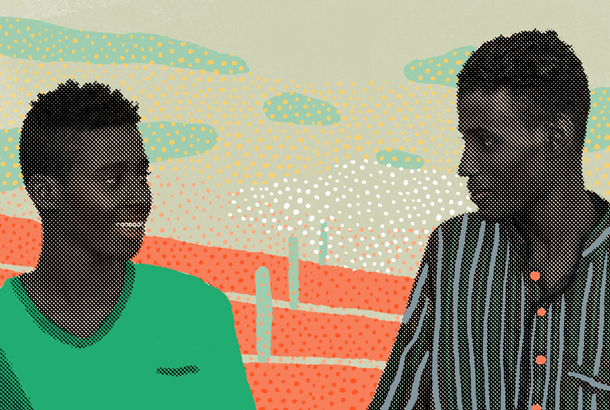
Said and Yarg (illustration by Vérane Cottin, photograph by Minority Rights Group International)
A rigid caste system is still present in Mauritania. The Haratine, or Black Moors, comprise a significant part of Mauritania’s population and suffer disenfranchisement and exclusion based on their membership in the “slave caste”.
Brothers Said and Yarg were born into slavery under this caste system, inheriting this status from their mother.
Said and Yarg were denied access to education and were stigmatized within their household.
“When referring to me, everyone would say ‘Said, the slave of this family.’ This hurt me. I questioned why I wasn’t allowed to play football like the other children,” Said explained.
Instead, they were forced to work full days. At first, they completed tasks around the house. Then, when they were older, they spent days in the hot sun tending to camels. The boys were frequently subject to beatings. They never had a day off.
In 2011, when Said was 11 and Yarg was 8, they managed to escape. Minority Rights Group International hired a lawyer to represent them both.
In November 2011, Said and Yarg’s master was found guilty under Mauritania’s 2007 anti-slavery law, which makes the practice of slavery a criminal offense.
“We’ve been waiting a long time, and our lives are very different. We are proud because we are free. We feel like we are people now,” said Said. Both brothers were able to attend school, and now have ambitions to defend other victims of slavery.
Access to Justice for Those Formerly Enslaved
In 1981, Mauritania became the last country to abolish slavery, but it only became a criminal offence in the country in 2007. As long as slavery remains a “deep rooted social practice”, limited implementation and enforcement of these laws prevents enslaved people from achieving justice, according to the United Nations Special Rapporteur on Contemporary Forms of Slavery.
In this context, the work of Minority Rights Group International and its partner organization SOS-Enclaves has been ground-breaking. The case of Said and Yarg in 2011 was the first successful prosecution under the 2007 law criminalizing slavery. Since then, some very encouraging progress has been made, including the adoption by the Government of a circular relating to the prosecution of slavery in 2021. Several cases of slavery recorded since 2007 were heard by a specialized court, which should lead to the conviction of perpetrators of slavery-like practice – a significant renewal of political will on the part of the Mauritanian State.
With the support of the United Nations Voluntary Trust Fund on Contemporary Forms of Slavery, Minority Rights Group International has ensured the proper prosecution of dozens of slavery cases, engaging with domestic, regional and international mechanisms to achieve outcomes.
Those enslaved face challenges enrolling in Mauritania’s civil registry, a prerequisite for access to education, formal employment, and basic services. SOS-Enclaves also works to provide slavery survivors with social support, enabling them to obtain the documentation they need to access services and to allow children to go to school.
There is far more work to be done, particularly in relation to ensuring the sentences slave owners receive are sufficient. Despite challenges, Minority Rights International aims to create cultural change and eradicate slavery in Mauritania.
Minority Rights International, in partnership with SOS-Enclaves, received its first grant from the United Nations Voluntary Trust Fund on Contemporary Forms of Slavery in 2011.
An Alternative to the Streets
Association Arc-en-Ciel (Gabon)
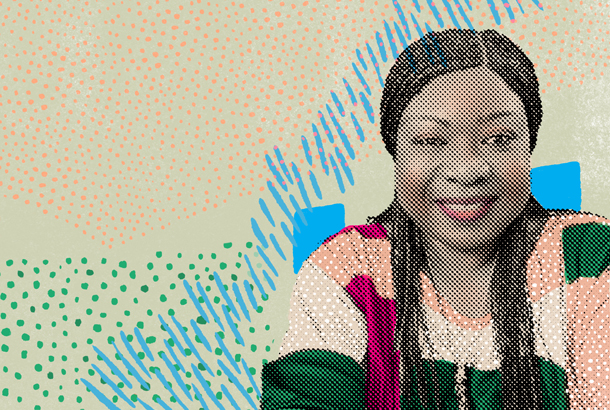
Badajina Mounguengui Leonie, Deputy Head of the Arc-en-Ciel Association (illustration by Vérane Cottin, photograph by Association Arc-en-Ciel)
The story varies from individual to individual — and from girl to boy — but Badajina Mounguengui Leonie, a social worker and deputy head of the Arc-en-Ciel Association, witnessed it dozens of times.
A child is approached by a “new” person in their parents’ lives; the parents agree to turn over the child for a better life or education; they are taken by rickety, wooden boats to more prosperous countries, and if they survive the journey, are either picked up by border patrol and detained, or put to work on the streets, housed in filth, and abused.
For more than 20 years, Arc-en-Ciel has been gathering survivors into temporary accommodation and ensuring they have medical treatment, food and psychosocial support. The organization is particularly active in the streets. “It is our favourite place to create links with children, parents, shopkeepers and neighbourhood residents to help protect children in Gabon,” Leonie said.
“Protected and Loved”
In the circle of child trafficking, Gabon is mostly a receiving country. UNICEF reports that many immigrant children from as far as Benin, Togo, Mali and Nigeria, among other neighbouring countries, are brought into the country. Many of the victims are girls who are exploited for labour. This exposes migrant children to violence, sexual harassment and crime, some of whom wind up at Arc-en-ciel.
Authorities in the region recognize that trafficking is a major problem and that children and families continue to get tricked by the false promises made by human traffickers. The Gabonese government has tried to address the problem by adopting the Child Trafficking Act in 2005, establishing the conditions for controls, investigations and searches in the fight against child trafficking in Gabon. But the underground nature of trafficking makes it very challenging to trace and protect children according to UNICEF.
Once they are found and stabilized, trafficking survivors receive reintegration services from Arc-en-Ciel. They always leave the organization with some kind of training in IT, catering, hairstyle, and other trades. In 2019, 41 children followed by the centre were able to successfully complete their school year or their training and move on with their lives, thanks in part to financial support provided by the United Nations Voluntary Trust Fund on Contemporary Forms of Slavery. One of them, Creppy Ayoko Odile, a girl from Togo, now knows how to read and has benefited from several courses, including sewing and patchwork.
“Arc-en-Ciel is my family. I feel protected and loved there,” she said. Once home, she says she will educate her relatives to “prevent more victims.”
Arc-en-Ciel received its first grant from the United Nations Voluntary Trust Fund on Contemporary Forms of Slavery in 2017.
